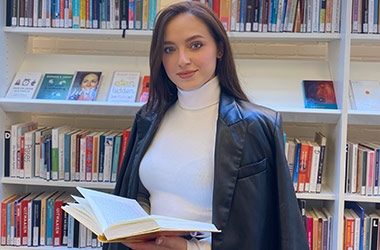Wittenborg Online News!
Research Investigates How University Instagram Profiles Shape Student Choices
Research Investigates How University Instagram Profiles Shape Student Choices
Research Investigates How University Instagram Profiles Shape Student Choices

Polina Kuyukina’s Thesis Reveals Influential Factors in Prospective Students’ Programme Choices
Digital media has been evolving fast and, in many ways, supplanting traditional media tools. These changes are also significant in the field of higher education and have influenced the relationship between institutions and students. For this reason, MBM student Polina Kuyukina decided to conduct her thesis research on how the functional and emotional characteristics communicated by Dutch universities on Instagram affect the study choices of international students who apply for bachelor’s and master’s programmes.
Kuyukina, who recently obtained a diploma in Digital Marketing & Communication, points out that nowadays it is not enough for businesses to be present on social media platforms and reach their target audience. In addition to that, companies must stand out from their competitors and demonstrate how customers will benefit from their products or services.
“Likewise, for educational institutions social media has become a valuable marketing and recruitment tool that offers great opportunities for demonstrating the benefits they have to offer to prospective applicants. One of my study’s goals is to show how educational institutions can maximise the effectiveness of recruiting strategies on Instagram, by communicating with potential students more effectively and highlighting the characteristics that make their institution appealing to this public,” she stresses.
To collect the primary data for her research, Kuyukina conducted
semi-structured interviews through focus groups composed of Wittenborg
bachelor’s and master’s students, with the goal of obtaining in-depth
knowledge of their experiences, choices and perspectives. Each focus
group included six international students, and while one of them
consisted of bachelor’s students, the other comprised master’s students.
The researcher’s goal was to make each group as diverse as possible in
terms of age, lifestyle, nationality and study background.
The
graduate explains that the interviews were based on a simulation in
which the students were presented with the Instagram profiles of two
real-life, major Dutch universities and had to choose where they would
prefer to pursue their degree. “The two institutions I chose have
different approaches to Instagram. One of them seeks to connect with
students on an emotional level, keeping them engaged and increasing
their satisfaction throughout their study life. The other is more
focused on helping students obtain knowledge and develop the necessary
skills to accomplish their career goals,” Kuyukina says.
During the activity, participants were asked open questions and had the opportunity to elaborate on their choices and perspectives. The goal was to identify what information students were looking for on the universities’ Instagram profiles, which type of content they prefer to see on those pages and what experiences they are looking for when choosing a university. Additionally, the researcher also sought to understand what perceptions students developed based on the universities’ profiles and how this influenced their decisions.
Kuyukina’s thesis concludes that Instagram plays a significant role in influencing the students’ decisions concerning the university where they would like to pursue their programmes. This is because the institutions’ profiles provide prospective students with a sense of what it is like to be part of that community as well as what type of academic and social experiences they can expect. The study also shows that while the study choices of bachelor’s students are more influenced by the emotional characteristics communicated by universities on Instagram, master’s students are highly impacted by both emotional and functional characteristics.
The researcher highlights that the universities' ability to express their commitment to the well-being of students and other stakeholders had a significant impact on the choices of both student groups.
“The research also found out that the way current and former students and their experiences are showcased by universities is the most influential factor in the study choices of both bachelor’s and master’s students. Additionally, the study choices of master’s students are highly impacted by the ability of the university to show that they can provide students with cutting-edge knowledge and skills to help students accomplish their career goals. Another important discovery is the fact that the study choices of both student groups are highly influenced by the ability of the university to create a welcoming, diverse and inclusive setting,” Kuyukina emphasises.
Regarding her plans for the future, the graduate, who is originally from Russia, says that she would like to stay in the Netherlands, which she considers her second home. “I have already got a full-time job and this was the first thing on my to-do list. I am currently working as a compliance specialist and, on top of that, I am planning to start my own small business as a hobby. I also want to travel more, explore the world and learn Dutch, because after six years living here, I think it is about time. And for the rest, we will see what the future will bring.”
WUP 29/8/2023
by Ulisses Sawczuk
©WUAS Press
823 words